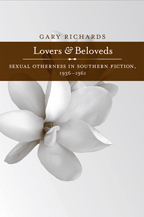
256 pages / 6.00 x 9.00 inches / none
A challenge to traditional criticism, this engaging study demonstrates that issues of sexuality-and same-sex desire in particular-were of central importance in the literary production of the Southern Renaissance. Especially during the end of that period-approximately the 1940s and 1950s-the national literary establishment tacitly designated the South as an allowable setting for fictionalized deviancy, thus permitting southern writers tremendous freedom to explore sexual otherness. In Lovers and Beloveds, Gary Richards draws on contemporary theories of sexuality in reading the fiction of six writers of the era who accepted that potentially pejorative characterization as an opportunity: Truman Capote, William Goyen, Harper Lee, Carson McCullers, Lillian Smith, and Richard Wright. Richards skillfully juxtaposes forgotten texts by those writers with canonical works to identify the complex narratives of same-sex desire. In their novels and stories, the authors consistently reimagine gender roles, centralize homoeroticism, and probe its relationship with class, race, biological sex, and southern identity. This is the first book to assess the significance of same-sex desire in a broad range of southern texts, making a crucial contribution to the study of both literature and sexuality.
Found an Error? Tell us about it.